注意
转到末尾下载完整的示例代码。或通过 Binder 在浏览器中运行此示例
Flood Fill#
Flood fill 是一种算法,用于根据图像中相邻值与初始种子点的相似度来识别和/或更改它们[1]。概念上的类比是许多图形编辑器中的“油漆桶”工具。
基本示例#
首先,一个基本示例,我们将把棋盘格中的一个白色方块更改为中灰色。
import numpy as np
import matplotlib.pyplot as plt
from skimage import data, filters, color, morphology
from skimage.segmentation import flood, flood_fill
checkers = data.checkerboard()
# Fill a square near the middle with value 127, starting at index (76, 76)
filled_checkers = flood_fill(checkers, (76, 76), 127)
fig, ax = plt.subplots(ncols=2, figsize=(10, 5))
ax[0].imshow(checkers, cmap=plt.cm.gray)
ax[0].set_title('Original')
ax[1].imshow(filled_checkers, cmap=plt.cm.gray)
ax[1].plot(76, 76, 'wo') # seed point
ax[1].set_title('After flood fill')
plt.show()
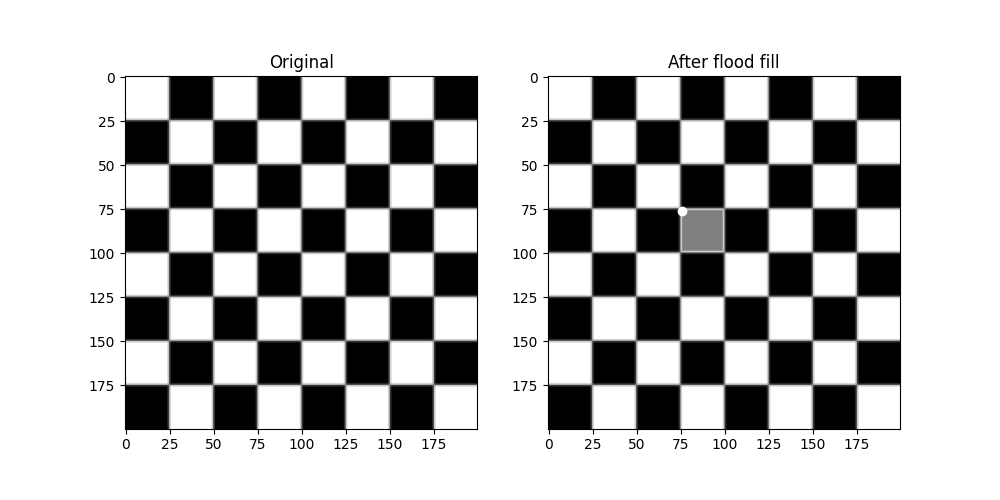
高级示例#
由于标准 flood fill 要求相邻像素严格相等,因此它在具有颜色渐变和噪声的真实图像中的使用受到限制。 tolerance 关键字参数扩大了初始值附近的允许范围,允许在真实图像上使用。
在这里,我们将在摄影师上进行一些实验。首先,将他的外套从深色变为浅色。
cameraman = data.camera()
# Change the cameraman's coat from dark to light (255). The seed point is
# chosen as (155, 150)
light_coat = flood_fill(cameraman, (155, 150), 255, tolerance=10)
fig, ax = plt.subplots(ncols=2, figsize=(10, 5))
ax[0].imshow(cameraman, cmap=plt.cm.gray)
ax[0].set_title('Original')
ax[0].axis('off')
ax[1].imshow(light_coat, cmap=plt.cm.gray)
ax[1].plot(150, 155, 'ro') # seed point
ax[1].set_title('After flood fill')
ax[1].axis('off')
plt.show()
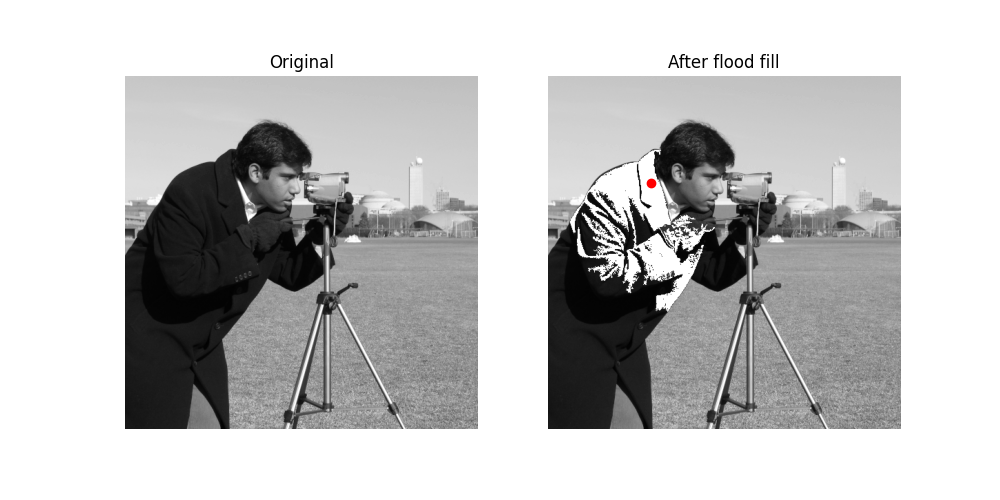
摄影师的外套呈不同深浅的灰色。只有与种子值附近阴影匹配的外套部分会发生变化。
公差实验#
为了更好地直观地理解公差参数的工作方式,这里有一组图像,逐步增加参数,种子点位于左上角。
output = []
for i in range(8):
tol = 5 + 20 * i
output.append(flood_fill(cameraman, (0, 0), 255, tolerance=tol))
# Initialize plot and place original image
fig, ax = plt.subplots(nrows=3, ncols=3, figsize=(12, 12))
ax[0, 0].imshow(cameraman, cmap=plt.cm.gray)
ax[0, 0].set_title('Original')
ax[0, 0].axis('off')
# Plot all eight different tolerances for comparison.
for i in range(8):
m, n = np.unravel_index(i + 1, (3, 3))
ax[m, n].imshow(output[i], cmap=plt.cm.gray)
ax[m, n].set_title(f'Tolerance {5 + 20 * i}')
ax[m, n].axis('off')
ax[m, n].plot(0, 0, 'bo') # seed point
fig.tight_layout()
plt.show()
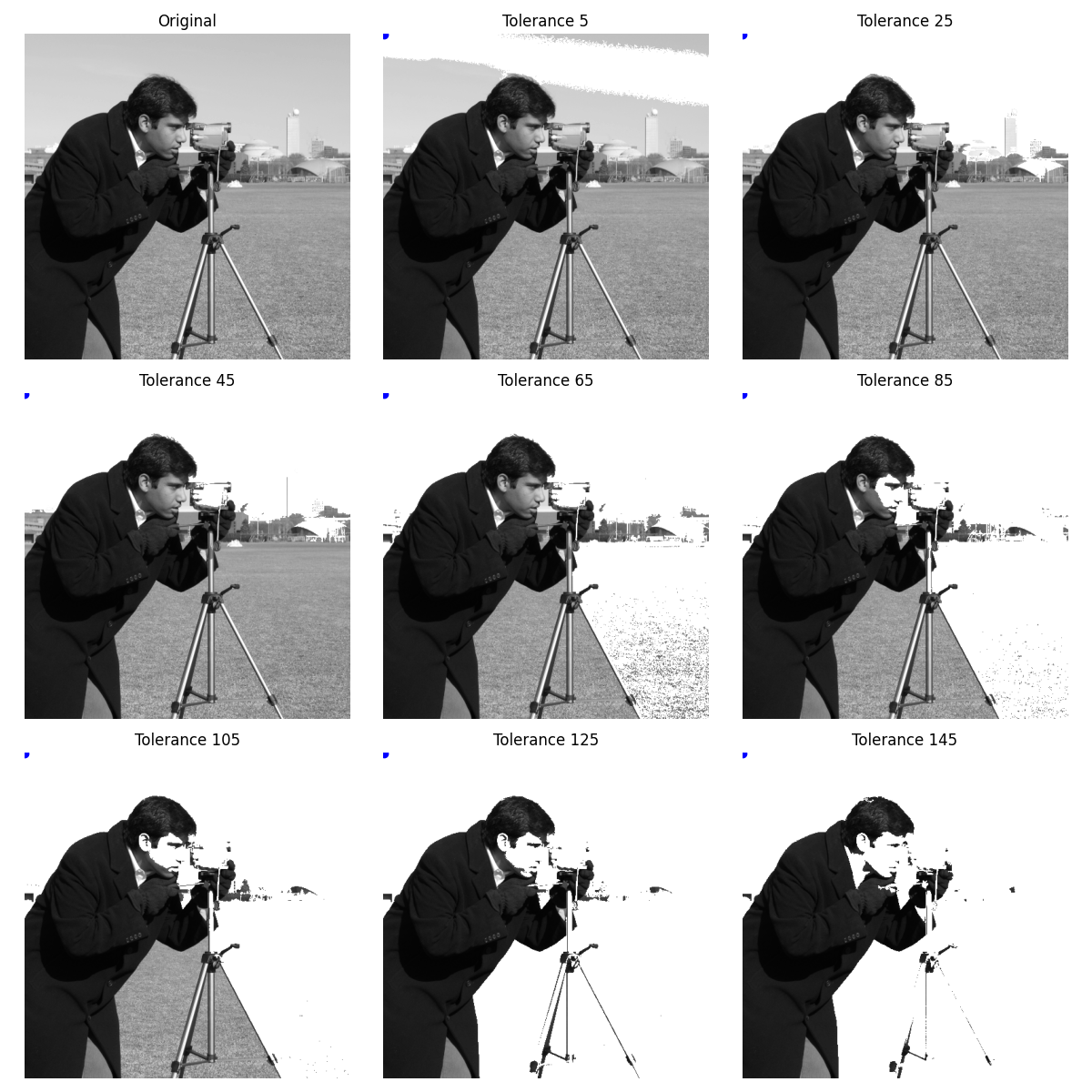
Flood 作为掩模#
一个姊妹函数 flood 可用,它返回一个标识 flood 的掩模,而不是修改图像本身。 这对于分割目的和更高级的分析管道很有用。
在这里,我们分割一只猫的鼻子。但是,flood[_fill] 不支持多通道图像。相反,我们对红色通道进行 Sobel 滤波以增强边缘,然后用公差填充鼻子。
cat = data.chelsea()
cat_sobel = filters.sobel(cat[..., 0])
cat_nose = flood(cat_sobel, (240, 265), tolerance=0.03)
fig, ax = plt.subplots(nrows=3, figsize=(10, 20))
ax[0].imshow(cat)
ax[0].set_title('Original')
ax[0].axis('off')
ax[1].imshow(cat_sobel)
ax[1].set_title('Sobel filtered')
ax[1].axis('off')
ax[2].imshow(cat)
ax[2].imshow(cat_nose, cmap=plt.cm.gray, alpha=0.3)
ax[2].plot(265, 240, 'wo') # seed point
ax[2].set_title('Nose segmented with `flood`')
ax[2].axis('off')
fig.tight_layout()
plt.show()
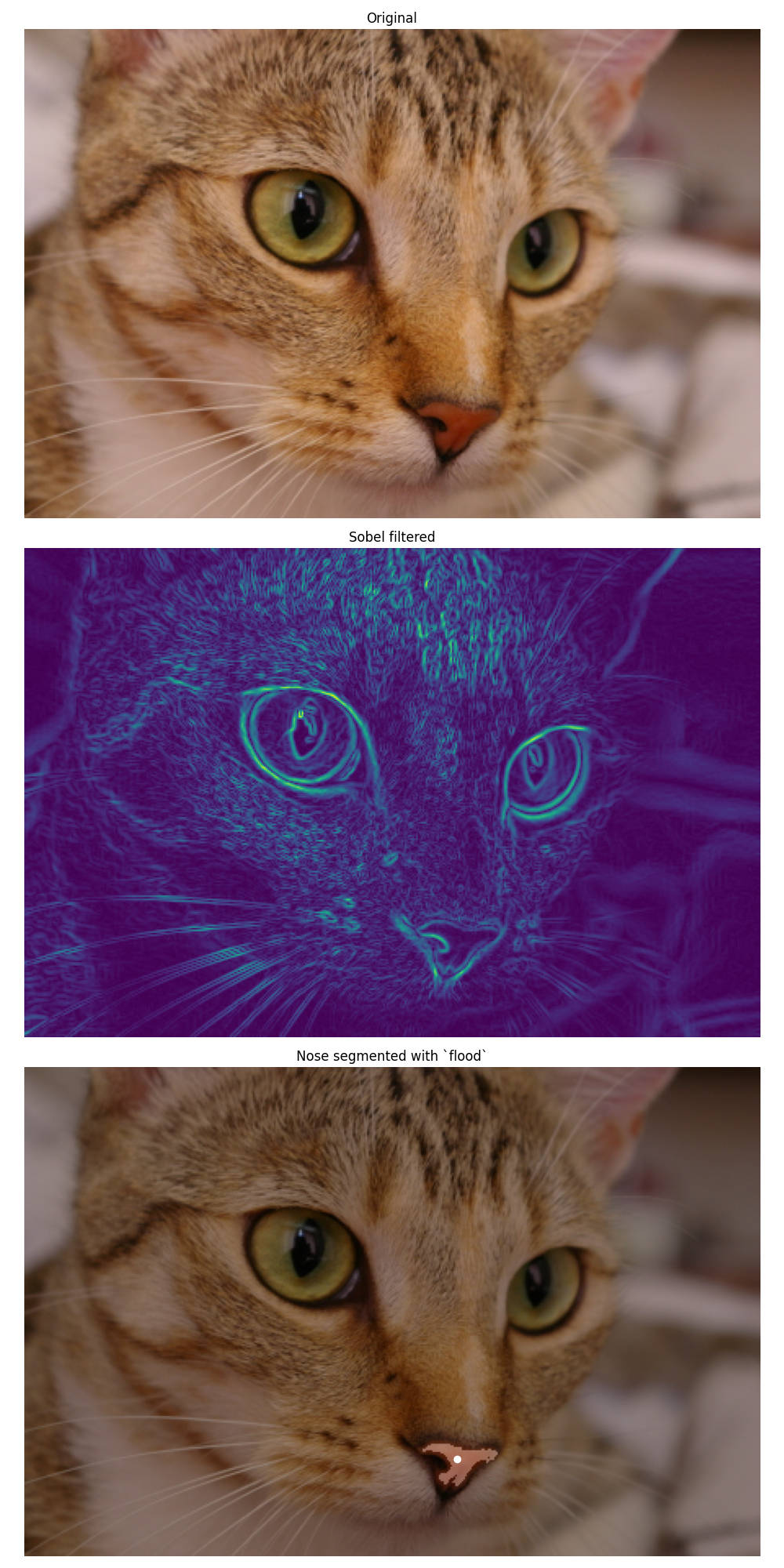
在 HSV 空间中 Flood fill 和掩模后处理#
由于 flood fill 在单通道图像上运行,因此我们在此处将图像转换为 HSV(色调、饱和度、值)空间,以便填充相似色调的像素。
在此示例中,我们还展示了可以使用 skimage.segmentation.flood() 返回的二值掩模进行后处理,这要归功于 skimage.morphology 的功能。
img = data.astronaut()
img_hsv = color.rgb2hsv(img)
img_hsv_copy = np.copy(img_hsv)
# flood function returns a mask of flooded pixels
mask = flood(img_hsv[..., 0], (313, 160), tolerance=0.016)
# Set pixels of mask to new value for hue channel
img_hsv[mask, 0] = 0.5
# Post-processing in order to improve the result
# Remove white pixels from flag, using saturation channel
mask_postprocessed = np.logical_and(mask, img_hsv_copy[..., 1] > 0.4)
# Remove thin structures with binary opening
mask_postprocessed = morphology.binary_opening(mask_postprocessed, np.ones((3, 3)))
# Fill small holes with binary closing
mask_postprocessed = morphology.binary_closing(mask_postprocessed, morphology.disk(20))
img_hsv_copy[mask_postprocessed, 0] = 0.5
fig, ax = plt.subplots(1, 2, figsize=(8, 4))
ax[0].imshow(color.hsv2rgb(img_hsv))
ax[0].axis('off')
ax[0].set_title('After flood fill')
ax[1].imshow(color.hsv2rgb(img_hsv_copy))
ax[1].axis('off')
ax[1].set_title('After flood fill and post-processing')
fig.tight_layout()
plt.show()
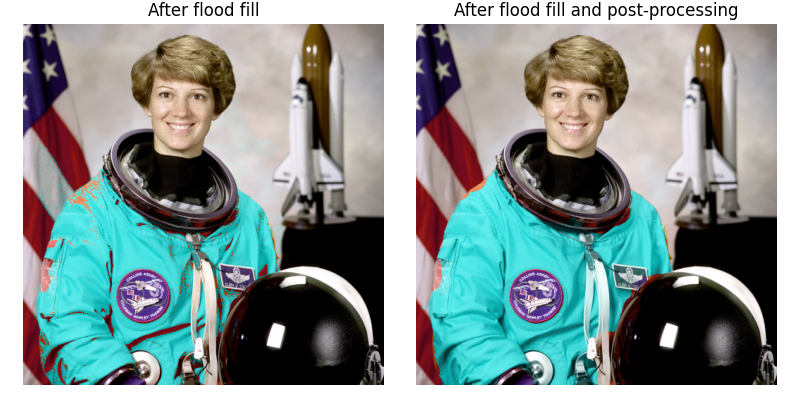
脚本的总运行时间:(0 分钟 12.429 秒)
